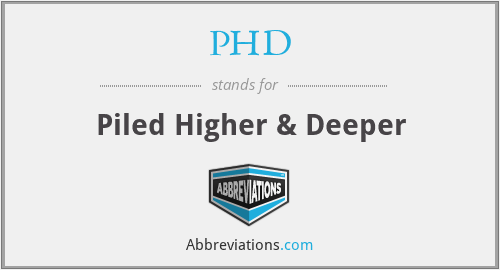"PHD." Abbreviations.com. STANDS4 LLC, 2025. Web. 19 Jan. 2025.<https://www.abbreviations.com/term/387815>.
"For the Lord hath poured out upon you the spirit of deep sleep, and hath closed your eyes: the prophets and your rulers, the seers hath he covered. And the vision of all is become unto you as the words of a book that is sealed, which men deliver to one that is learned, saying, Read this, I pray thee: and he saith, I cannot; for it is sealed: And the book is delivered to him that is not learned, saying, Read this, I pray thee: and he saith, I am not learned. Wherefore the Lord said, Forasmuch as this people draw near me with their mouth, and with their lips do honour me, but have removed their heart far from me, and their fear toward me is taught by the precept of men: Therefore, behold, I will proceed to do a marvellous work among this people, even a marvellous work and a wonder: for the wisdom of their wise men shall perish, and the understanding of their prudent men shall be hid." (Isaiah 29:10-14)
1. Outside of Restored Christianity, the above Isaiah quote generates generic commentary about the choice of attitude each of us have in listening to God. In parallel with Jesus's mockery of Pharisees as "whited walls" who profess a great understanding of the law, but who comprehend its fundamentals so little that they can't even recognize the Messiah right in front of their eyes, Protestant thought teaches that book learning doesn't guarantee spiritual wisdom--that you can have credentials and amass readings, and still miss the point. Both the unlearned illiterate and the learned readers get no benefit from the contents of a sealed book. While that's a fair reading of the passage's general content, two things are true: a. few "experts" feel personally implicated by passages like this even though we all should; b. new information initiates interpreters to new hermeneutic possibilities.
Self-satisfied that they would never be guilty of the errors of the Pharisees, many well-meaning Bible believers and Doctors of Divinity fail to note that their careful sola scriptura strictures put them afoul of the very root of Christ's critique--the Pharisees also claimed that only prior scripture should be trusted as the source of God's voice. Their approach to truth was as sophic as the bulk of Protestantism today--Catholicism too, with the exception of the Pope, one could argue. And in all three cases, as extensive compilation of commentary gradually substitutes for scripture itself over time, the mantic spirit Christ Himself embodied and inspired across the centuries of His manifestations to prophets is lost to erroneous argumentation. Please understand: I mean no insult to honest seekers of truth whose consistent philosophies limit their understanding. I only point out that it's possible to be internally consistent and well-meaning, and God-fearing, and honest, and still wrong.
This passage from Isaiah has a more concrete reference to a sealed book and a learned man being unable to read it--not out of over-education, but out of self-interest in not being able to control the profits from it. And the man without proper letters, the very concrete Joseph Smith, may not have had the formal training, but did have the gift and power given by God to read the book that was sealed to others. Isaiah didn't explicitly tie the unlearned man as the agent of producing the marvelous work, but he didn't forbid it either, and his move to describe the kind of work that would be wondrous and bring hearts back into alignment with the Lord in contrast with the lips that merely profess, but don't honor as one that only the unlearned could do (the wisdom of the wise men being insufficient to this task).
The Martin Harris account, published in this canonized history after he had left the church, but which he continued to attest despite incentives to recant, tells of a hand-copied page of "Reformed Egyptian" symbols which a reputable professor at Columbia verbally certified, but who likely had no clue he was uttering nearly to the letter Isaiah's 2600 year-old words when he ripped up his draft of a written certification upon learning that the book was sealed: "I cannot read a sealed book" (JS-H 1:65).
He also could not have predicted, as self-interested as he was in either glorifying himself in its translation, or in discrediting it altogether, how the coming forth of the Book of Mormon and the consequently Restored Church and its advancement would resemble the marvelous work and wonder Isaiah clearly prophesied. And only those open to the mantic mode of truth-seeking will come to know of its truth, further hiding the wisdom of the world's Christian, but misguided prudent men and other scholars.
2. As part of my own project of study to bring scripture as much to life as I can, I did a little digging into the scholarly atmosphere of the day. Maybe a detail or two here will help someone else get more out of their study as well. Contextual elements like this also deepen my sense of how God prepares the conditions for His actions.
First off, Anthon wasn't an Egyptologist, and while he had a background in other ancient cultures and languages, some of his knowledge of Egypt could only have been in the infancy of the West's earliest modern understanding of Egyptian scripts. Napoleonic campaigns in Egypt brought to France and England a number of artifacts whose procurement was of dubious ethics, but whose importance to history, archeology, and linguistics has proven immense. One such was the famous Rosetta Stone which sat undeciphered in a British museum for decades before a young student in the fledgling discipline of "Egyptology" made a few key assumptions about the hieroglyphs on the stele that appeared to match the meaning of the Greek script it also contained. This Jean-François Champollion had to battle a scholarly misconception about hieroglyphs themselves. It was well known that ideographs, glyphs that convey an entire idea rather than transcribe the phonetic form of the idea, can serve as vehicles for multiple languages. It was also well established that across the millenia that Egypt used writing, there were three identifiable scripts that the spoken language, which also evolved over such lengthy periods, made use of. Because the kinds of monarchs and priests who commanded the construction of monuments were also the kind to want themselves memorialized in the most indelible ways, the surviving exemplars of one of these scripts--hieroglyphics--was almost exclusively found in temples and funerary edifices. This led to the false conclusion that hieroglyphics was only used for religious purposes and therefore didn't represent the spoken language of the normal people. Champollion contested this idea, showing how there might be a progression of the more purely ideographic hieroglyphics to the more frequent phonetic markings used on more corruptible papyrii in the hieratic script could finally lead to the more alphabetic demotic script which itself was likely connected as an ancestor to the modern-day Coptic tongue still spoken in parts of Egypt (it's one of the world's oldest continuously spoken languages still extant). This logical leap allowed him to parse out some names on the Rosetta Stone that were attested elsewhere, and then abstract out a few phonetic symbols which then gave him a key to more and more, until the full stone had its translation worked out.
His work on the Rosetta Stone was published posthumously not long after completed, as Champollion died relatively young (age 41) of a stroke that many attributed to the after-effects of an arduous journey to Egypt and back to France. That publication was less than 6 years old, and not likely available in translated form for the contemporary New York professor Charles Anthon to have digested (although I have no idea whether he spoke French) to have very deep insight as to the nature or meaning of any Egyptian script let alone one written in a derived form of Demotic used to transcribe Hebrew rather than the ancestor tongue of the Copts, and then modified over the thousand years of Nephite linguistic evolution.
The state of Egyptology in the US in 1828, when Martin Harris made the trip to New York to obtain second opinions as to the wisdom of his investment in the Book of Mormon translation and publication projects he was heavily leveraged on, simply didn't have a whole lot to it just yet.
But even if it did, the way to test it is in its pages, not through scholarly examination of the archeological materials. The way to know if Joseph Smith was a prophet is to pray, as he did, with real intent and having faith in Christ to know if the Book of Mormon is true. And this manner of proving the prophets isn't contained only in its pages, but is also among the Savior's own prescriptions as recorded in Matthew: "by their fruits ye shall know them". The fruits and gifts of the Spirit seem to scientism too subjective, but they bring precisely the testimony of truth the world needs. The marvelous work and a wonder is afoot.


No comments:
Post a Comment